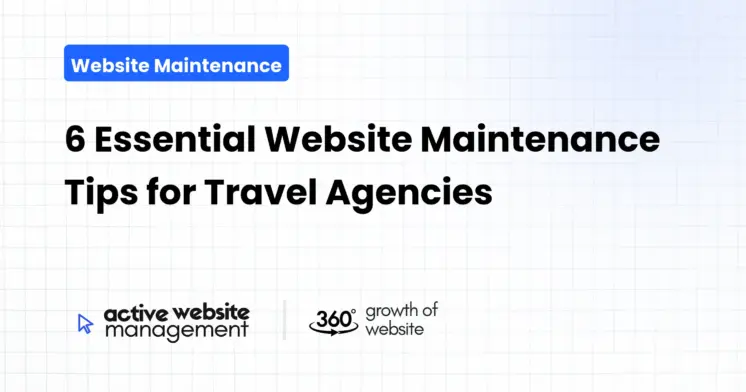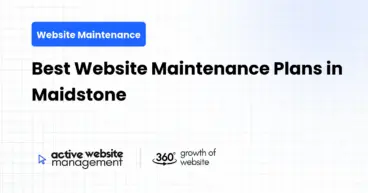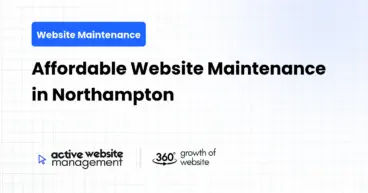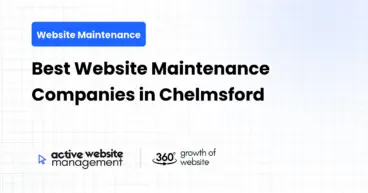January 25, 2025
11 min read
In today’s digital world, your travel agency’s website isn’t just a brochure; it’s your virtual storefront, your 24/7 salesperson, and the central hub for your business. Just like a physical office, your website needs regular upkeep to ensure it’s welcoming, functional, and effective. Neglecting website maintenance can lead to lost bookings, frustrated customers, and a damaged reputation. This guide will outline six essential maintenance tips that will keep your travel agency’s website in peak condition, driving traffic and boosting your bottom line.
1. The Cornerstone: Regular Software and Plugin Updates
Why are Updates Crucial?
Imagine your office door lock being outdated. It would be easy for an intruder to get in, right? The same principle applies to your website’s software. Outdated software, plugins, and themes can leave your site vulnerable to security threats, slow down loading times, and create compatibility issues. Just like a well-oiled machine needs regular tune-ups, your website requires constant updates. Think of it as travel website upkeep.
What Needs Updating?
- Content Management System (CMS): Whether you’re using WordPress, Drupal, or another platform, staying up-to-date with the latest version is critical. These updates often include security patches, performance enhancements, and new features.
- Plugins and Extensions: These add functionality to your website, but outdated ones can create security holes or cause conflicts. Regularly check for updates and remove any unused or abandoned plugins. Tourism site care requires meticulous attention to these details.
- Themes: Your website’s visual design is governed by its theme. Theme updates often address bugs, improve responsiveness, and offer new customization options.
How to Update Efficiently
- Enable Automatic Updates (Carefully): Many CMS platforms allow for automatic updates, which is useful for minor changes. However, for major core updates, it’s best to test them on a staging environment first to avoid disrupting your live website.
- Create a Schedule: Set aside a specific day each week or month to check for updates. Consistency is key to preventing issues from piling up.
- Backup Before Updating: Always back up your entire website before making any updates. This will allow you to quickly restore your website to its previous state if anything goes wrong.
Benefits of Regular Updates
- Enhanced Security: Patch vulnerabilities and protect your site from malware and hackers.
- Improved Performance: Speed up your website’s loading times and offer a smoother browsing experience for users.
- New Features and Functionality: Gain access to the latest tools and improvements offered by your CMS, plugins, and themes.
- Compatibility: Ensure your website works flawlessly across different devices and browsers.
This ensures that your booking platform maintenance is always at the highest possible level.
2. The Lifeline: Consistent Content Refreshment
Why is Fresh Content Important?
In the world of travel, things change rapidly. New destinations emerge, attractions update their offerings, and travel restrictions shift constantly. Your website’s content needs to reflect these changes to stay relevant and trustworthy. Stale or outdated content can turn away potential customers, while fresh, engaging content keeps them coming back.
What Content Needs Refreshing?
- Package Deals and Tours: Ensure prices, dates, and itineraries are accurate and up-to-date. Remove any deals that are no longer available.
- Destination Guides and Information: Regularly review and update information on destinations, attractions, and local regulations. Make sure your guides reflect the latest information.
- Blog Posts and Articles: Create new blog content on a regular basis to attract new visitors and keep existing customers engaged.
- Images and Videos: Use high-quality, recent images and videos that showcase your destinations and services in the best light.
- Testimonials and Reviews: Feature recent customer testimonials and reviews to build trust and credibility.
How to Refresh Content Effectively
- Create a Content Calendar: Plan your content updates in advance, scheduling new blog posts, website revisions, and other content activities on a regular basis.
- Use Data to Guide Your Decisions: Analyze your website analytics to determine which pages are performing well and which ones need improvement.
- Gather Feedback from Customers: Ask your customers for feedback on your website and its content.
- Monitor Industry Trends: Stay informed about new travel trends and update your content accordingly.
Benefits of Consistent Content Updates
- Improved Search Engine Rankings: Search engines prioritize websites with fresh and relevant content.
- Increased User Engagement: Fresh content keeps users interested in your website and encourages them to spend more time browsing.
- Build Trust and Credibility: By providing up-to-date information, you establish your website as a reliable source of travel knowledge.
- Higher Conversion Rates: Engaging and relevant content leads to more bookings and inquiries.
Travel website upkeep must encompass regular content refreshment.
3. The Foundation: Regular Security Audits
Why are Security Audits Vital?
The digital landscape is constantly evolving, and so are the methods used by hackers. Relying solely on software updates may not be enough to protect your website from all threats. Regular security audits are essential to identify vulnerabilities and implement necessary security measures. Neglecting this area can lead to significant financial loss, reputational damage, and loss of customer trust.
What Should Be Included in a Security Audit?
- Vulnerability Scanning: Use automated tools to scan your website for known security vulnerabilities.
- Password Audits: Ensure all user accounts use strong and unique passwords, and enforce regular password changes.
- SSL Certificate Verification: Make sure your website has a valid and up-to-date SSL certificate to encrypt data transmitted between your website and users’ browsers.
- Security Plugin Configuration: Review the settings of your security plugins to ensure they are configured correctly and are actively protecting your site.
- User Permission Check: Make sure that only authorized personnel have access to your website’s backend.
- Database Backup Check: Verify that database backups are being performed regularly and can be restored.
- Malware Scans: Regularly scan your website for malware and remove any infections promptly.
How to Conduct Security Audits
- Use Security Scanners: Utilize free or paid website security scanning tools to automate the process.
- Hire a Security Professional: For a more comprehensive security audit, consider hiring a professional security expert.
- Follow Industry Best Practices: Stay up-to-date on the latest security best practices and implement them on your website.
- Regularly Review and Update Security Procedures: The digital landscape changes constantly, so it’s important to update your security procedures on an ongoing basis.
Benefits of Regular Security Audits
- Protection Against Cyber Threats: Identify and mitigate vulnerabilities before hackers can exploit them.
- Data Protection: Ensure that your customers’ sensitive information is kept safe and secure.
- Business Continuity: Minimize the risk of website downtime caused by cyberattacks.
- Build Customer Confidence: Demonstrate that you take website security seriously, building trust with your customers.
This rigorous process is an integral part of tourism site care.
Don’t Just Maintain Your Website—
Grow It using Active Website Management! Don't Wait for Growth—Accelerate It with Active Website Management
Why is Website Performance Important?
In today’s fast-paced world, users expect websites to load quickly and efficiently. A slow-loading website can lead to frustration, a higher bounce rate, and lost bookings. Website performance is an essential aspect of the user experience, impacting both customer satisfaction and search engine rankings. Booking platform maintenance must focus on speed and responsiveness.
What Impacts Website Performance?
- Large Images and Videos: Unoptimized media files can significantly slow down your website’s loading time.
- Excessive Plugins and Scripts: Too many plugins or poorly written scripts can bog down your website.
- Poor Caching: Inefficient caching can cause browsers to reload the same resources repeatedly.
- Hosting Issues: Inadequate or underpowered hosting can negatively impact your website’s performance.
- Database Issues: An overloaded or unoptimized database can lead to slow loading times.
How to Optimize Website Performance
- Optimize Images and Videos: Use compression tools to reduce the file size of images and videos without sacrificing quality.
- Minimize Plugins: Remove any unused or unnecessary plugins. Consider using lightweight plugins instead of bloated ones.
- Enable Caching: Use browser caching, server-side caching, and CDN caching to speed up loading times.
- Choose Reliable Hosting: Select a hosting provider that offers sufficient resources and is optimized for your CMS.
- Optimize Your Database: Regularly optimize your database to remove unnecessary data and improve performance.
- Use a Content Delivery Network (CDN): A CDN can distribute your website’s content across multiple servers, reducing the time it takes for users to load your website.
- Implement Lazy Loading: Lazy loading defers the loading of non-critical resources, improving initial page load time.
- Test Your Website’s Speed: Use tools like Google PageSpeed Insights, GTmetrix, or Pingdom to analyze your website’s performance and identify areas for improvement.
Benefits of Performance Optimization
- Faster Loading Times: Provide a better user experience and reduce bounce rates.
- Improved Search Engine Rankings: Search engines consider website performance as a ranking factor.
- Increased Conversions: Faster loading times lead to more conversions and bookings.
- Reduced Server Load: Reduce the load on your server, leading to a smoother operation.
Regularly optimizing the performance of your travel website is crucial for success.
5. The Bridge: Checking and Fixing Broken Links
Why is Link Maintenance Important?
Broken links can damage the user experience and negatively impact your website’s credibility. When users click on a link and are met with a “404 Not Found” error, they may become frustrated and leave your website. Internal and external link management is crucial to prevent this.
Types of Broken Links
- Internal Broken Links: Links that point to pages or resources within your own website that no longer exist.
- External Broken Links: Links that point to pages or resources on other websites that are no longer available or have moved.
How to Check for Broken Links
- Use a Link Checker Tool: Utilize free or paid broken link checker tools to scan your website for broken links.
- Manually Check Links: Periodically check your website’s internal and external links to identify any broken links.
- Monitor Website Analytics: Monitor your website’s analytics to identify any pages that are receiving a high number of error messages.
How to Fix Broken Links
- Update the Link: Update the broken link to point to the correct destination.
- Remove the Link: If the linked resource is no longer available, remove the link.
- Redirect the Link: Redirect the broken link to an appropriate alternative page or resource.
- Create a Custom 404 Page: Create a user-friendly custom 404 error page that helps users find what they’re looking for.
Benefits of Regular Link Maintenance
- Improved User Experience: Ensure that users can easily navigate your website and find the information they need.
- Enhanced SEO: Search engines penalize websites with broken links, so fixing them can improve your search engine rankings.
- Improved Website Credibility: Avoid frustrating users with broken links, increasing their confidence in your website and services.
This meticulous attention to detail is essential for effective travel website upkeep.
6. The Proactive Approach: Active Website Management
Why is Active Website Management Crucial?
While regular maintenance tasks are essential, active website management goes a step further by monitoring your website 24/7, proactively addressing potential issues, and continuously optimizing your site for optimal performance and user experience. Instead of simply reacting to problems, active management aims to prevent them before they even occur.
What Does Active Website Management Entail?
- 24/7 Monitoring: Real-time monitoring of website performance, security, and functionality.
- Proactive Problem Solving: Addressing potential issues before they impact your users.
- Continuous Optimization: Regularly optimizing your website for speed, performance, and user experience.
- Security Threat Monitoring: Staying ahead of potential threats, malware, and hacking attempts.
- Performance Analysis: Monitoring your website’s traffic, conversion rates, and user behavior.
- Regular Backups: Performing frequent backups of your website’s files and database.
- Technical Support: Providing technical support and assistance when needed.
Benefits of Active Website Management
- Reduced Website Downtime: Minimize downtime and ensure that your website is always available to users.
- Improved Website Security: Protect your website from cyber threats and data breaches.
- Enhanced Website Performance: Keep your website running at peak performance.
- Improved User Experience: Provide a seamless browsing experience for your website visitors.
- Increased Conversion Rates: Maximize your booking potential and increase revenue.
- Peace of Mind: Focus on growing your business knowing your website is in capable hands.
Active Website Management, like the kind offered by Active Website Management, can give you the confidence of knowing that your online storefront is being cared for by professionals who understand the importance of a well-maintained website. It’s not just about fixing problems when they occur, it’s about making sure they don’t happen in the first place. It’s a proactive strategy that ensures your online presence is always ready to meet the demands of your travel agency.
Conclusion
Maintaining a successful travel agency website requires a commitment to regular upkeep and active management. By following these six essential tips, you can ensure that your website is secure, fast, user-friendly, and effective at attracting new customers and driving bookings. Remember, your website is a crucial asset for your business, and investing in its maintenance is investing in your success. By making booking platform maintenance and overall website health a priority, you’ll be well on your way to achieving your business goals.







